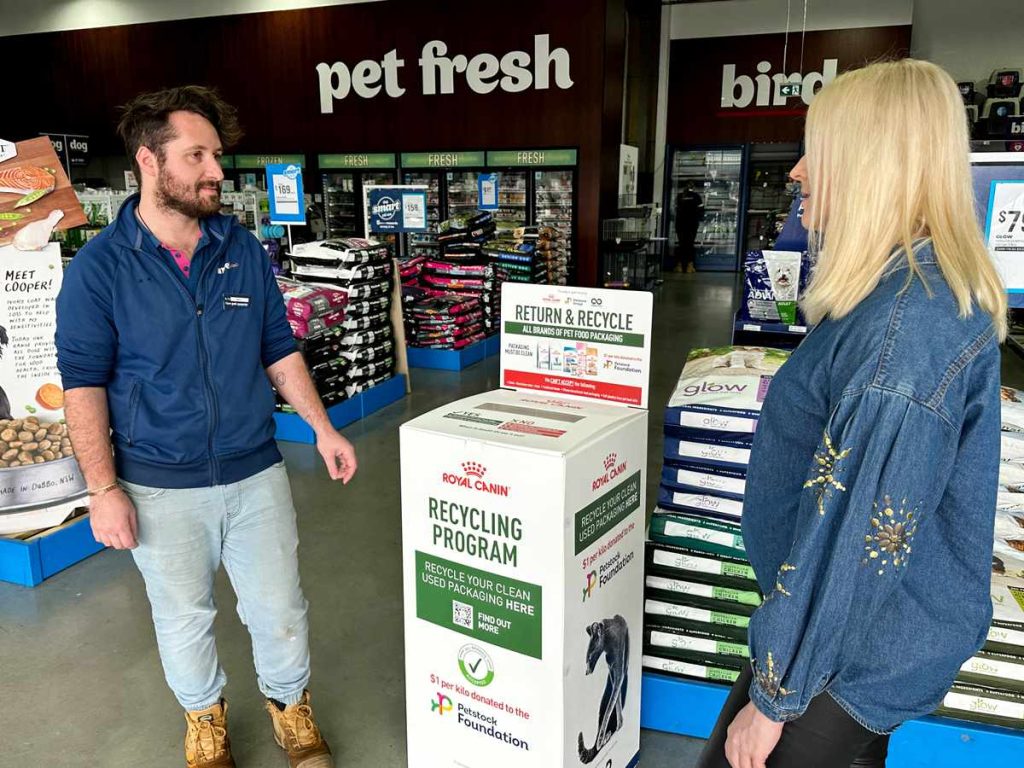New initiative encourages recycling pet food packaging
October 7, 2023


Estimated reading time: 1 minute
Click to read our latest animal + pet news articles
Recycling pet food packaging
In a joint effort to combat the war on waste, leading pet and recycling companies are joining forces to help Australians with recycling pet food packaging.
In collaboration with Royal Canin and TerraCycle, the Petstock Group, will launch the ‘Royal Canin Recycling Program’.
The initiative will be at a variety of Petstock, Best Friends, Pet City, and My Pet Warehouse stores nationwide.
Benefits of recycling pet food packaging
The initiative aims to address the significant contribution of pet food materials to the country’s waste.
With an estimated 28.7 million pets in Australia, pet food materials amounts to over 63.8 million tonnes of waste annually.
Until now, Australian pet owners had limited opportunities to recycle pet food soft plastic packaging, such as dog and cat kibble bags and wet food pouches.


Practical and logistical obstacles have hindered recycling efforts, emphasising the need for brands and retailers to collaborate and provide effective and easily accessible recycling solutions.
“Our business believes that together, we can make an impact for people, pets, and the planet,” says Shane Young, CEO of the Petstock Group.
“We continue to explore sustainability initiatives and remain dedicated to improving both our carbon footprint and supporting our customers in reducing their impact on the planet.”
Dean Richardson, Royal Canin Sustainability and Partnerships Manager, commended the Petstock Group’s commitment to sustainability.


He also welcomed their participation in the Royal Canin Recycling Program.
“We are always looking for ways to work with like-minded businesses to improve the circular economy in pet packaging,” says Richardson.
“Partnering with the Petstock Group allows us to maximise the opportunity to recycle across their network of over 220 stores.”
Meanwhile, Jean Bailliard, General Manager of TerraCycle ANZ, said she is extremely happy with the expansion of the program.
“By providing access to a recycling option in the retail environment, Petstock and Royal Canin are providing Australian and New Zealand animal lovers with confidence that they are doing the right thing by their pets and the planet.”
How the program works
The program offers pet parents a convenient and accessible way to recycle all brands of pet food packaging.
They can take their soft plastics for recycling while picking up new pet food and other supplies.
To participate in the Royal Canin Recycling Program, pet owners can return clean pet-specific soft plastics to any Petstock, Best Friends, Pet City, or My Pet Warehouse store.
They can then deposit them in the designated recycling program boxes.
The collected materials will be processed by TerraCycle and transformed into new materials.
Once the collection boxes at Petstock stores are full, the contents will go to TerraCycle.
There, they will manually sort into different waste streams.
The materials will then go to special processing facilities to turn into raw materials.
These raw materials can produce new products, closing the loop of the recycling journey.
Potential end products include benches, pot plants, compost bins, playgrounds, and dog agility equipment.
Support animal charities
Adding extra incentive, $1 will be donated to the Petstock Foundation for every kilo of pet food packaging donated.
The Petstock Foundation is a registered charity organisation that works to improve the lives of both people and pets.
So, by participating in the recycling program, customers also support animal-centric charities across the country.
Why do we recycle?
Recycling is a crucial practice that plays a vital role in reducing waste and protecting the environment.
By collecting and processing materials that would otherwise end up in landfills, recycling helps conserve natural resources, reduce pollution, and minimise the carbon footprint associated with the production of new goods.
Here are some key reasons why recycling is important:
Conservation of resources: Recycling allows us to reuse materials such as paper, plastic, glass, and metal, reducing the need for extracting and processing virgin resources. By conserving these valuable resources, we can preserve forests, reduce energy consumption, and minimize the environmental impact of mining and extraction activities.
Waste reduction: Recycling helps divert waste from landfills, which not only saves valuable landfill space but also prevents the release of harmful substances into the environment.
Landfills produce methane, a potent greenhouse gas that contributes to climate change.
By recycling, we can significantly reduce the amount of waste that ends up in landfills and mitigate its negative environmental effects.
Energy savings: Producing goods from recycled materials requires less energy compared to manufacturing products from raw materials.
Recycling reduces the energy-intensive processes involved in extraction, refining, and transportation, leading to significant energy savings and a reduction in greenhouse gas emissions.
Pollution prevention: The production of goods from raw materials often involves the release of pollutants into the air, water, and soil.
Recycling helps minimise pollution by reducing the need for these resource-intensive processes.
Additionally, recycling reduces the demand for landfill space, which can contaminate groundwater and release harmful chemicals into the environment.
Economic benefits: Recycling not only benefits the environment but also contributes to the economy. It creates jobs in recycling facilities, waste management, and related industries.
Moreover, recycling reduces the costs associated with waste disposal, as recycling materials can be used to create new products, reducing the need for expensive raw materials.
READ MORE FROM ANIMAL FRIENDLY LIFE
Aussie healthy dog food brand puts planet first
Therapy dogs helping vulnerable kids
